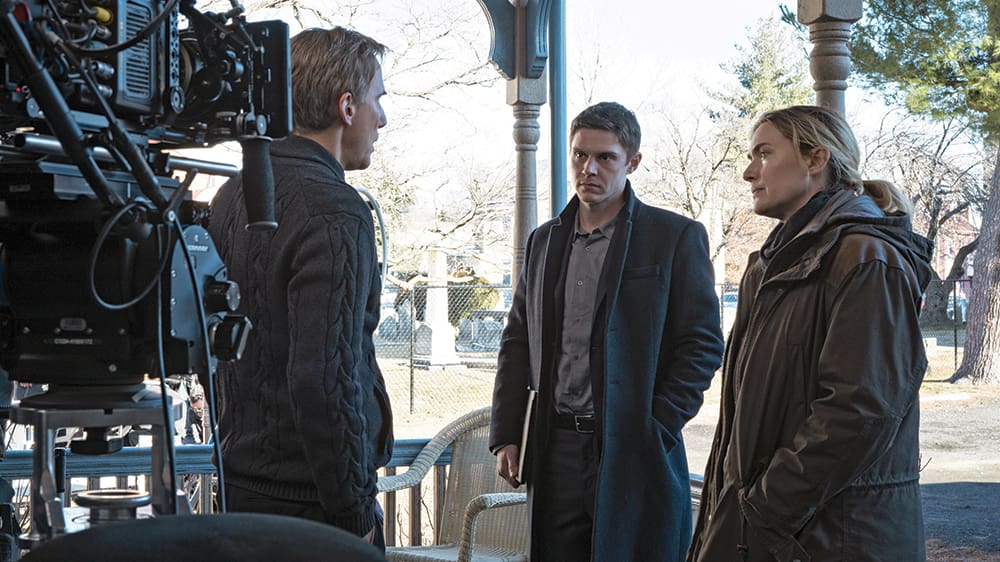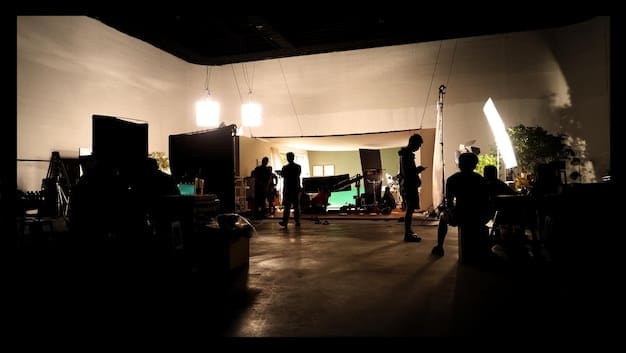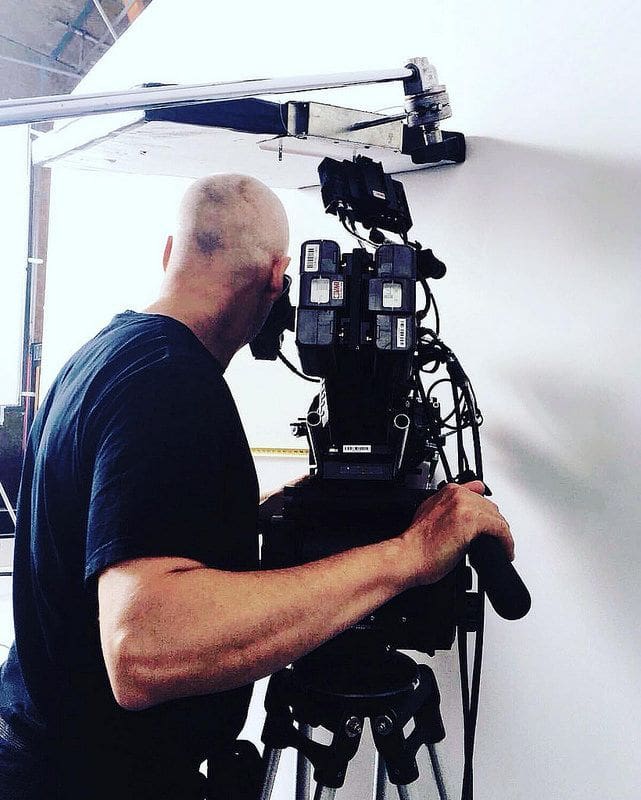Entertainment
7 Crucial Script Supervision Skills for Flawless Film Production


You may not realize it, but behind every successful film production lies the meticulous work of a skilled script supervisor.
From ensuring seamless continuity to managing scene timing and dialogue accuracy, the role of a script supervisor is crucial in maintaining the overall quality of the final product.
However, there are seven key skills that elevate a script supervisor from competent to exceptional.
These skills not only contribute to flawless film production but also play a significant role in the success of the entire project.
Key Takeaways
- Continuity management and scene timing are essential for seamless visual and auditory details in a film.
- Dialogue accuracy and actor positioning contribute to a cohesive and believable narrative.
- Note-taking and script revisions play a crucial role in maintaining consistency and coherence in the final product.
- Collaboration with writers and active participation in production meetings enhance the overall success of the film production process.
Continuity Management
To ensure seamless continuity in your film production, the script supervisor must meticulously track all visual and auditory details from scene to scene. This involves keeping a sharp eye on actors’ positions, props, costumes, and even the smallest details like the level of liquid in a glass.
Your role is to ensure that each shot matches the preceding and following ones, creating a coherent flow in the final product. It’s crucial to communicate effectively with the director and other crew members to address any discrepancies and make necessary adjustments.
As the script supervisor, you play a key role in maintaining the authenticity of the story and the visual consistency of the film. Your attention to detail will help prevent distractions for the audience, allowing them to remain fully immersed in the narrative.
Scene Timing
When managing scene timing as a script supervisor, ensure precise coordination of actors’ movements and dialogue to maintain the pacing and rhythm of the film. Scene timing is crucial for creating a seamless flow and capturing the audience’s attention.
To excel in this aspect of script supervision, consider the following:
- Communication: Keep an open line of communication with the director and cinematographer to understand their vision for the timing of each scene. This will help you align the actors’ performances with the overall pacing of the film.
- Rehearsals: Encourage rehearsals where actors can practice their movements and lines within the specific timing constraints of the scene. This allows for adjustments and fine-tuning before the actual filming takes place.
- Attention to Detail: Pay meticulous attention to the timing of each action and line delivery during filming. Even small deviations can disrupt the flow of the scene, so being vigilant is key to maintaining consistency.
Dialogue Accuracy
Make sure to keep a keen eye on line continuity and pronunciation checks. These are crucial elements in ensuring dialogue accuracy in the film production process.
Line Continuity
Ensure accurate dialogue continuity by meticulously tracking and verifying each line to maintain seamless flow and authenticity in the film production process. Line continuity is crucial for creating a cohesive and believable narrative. Here are three essential tips to help you master this skill:
- Script Familiarity: Fully understand the script to anticipate and rectify any discrepancies in dialogue delivery.
- Detailed Notes: Take precise and organized notes on each take to ensure consistency in the delivery of lines.
- Communication: Maintain open communication with the director, actors, and other crew members to address any issues and ensure accuracy in dialogue delivery.
Pronunciation Checks
To achieve precise pronunciation in dialogue delivery, attentively listen for any potential mispronunciations and promptly address them to maintain the accuracy and authenticity of the film production process.
As a script supervisor, your keen ear for language nuances is crucial in ensuring that the dialogue is delivered with the correct pronunciation. Take note of any deviations from the intended pronunciation and communicate effectively with the cast and crew to rectify any inaccuracies.
By doing so, you contribute to the overall quality of the production and help the actors maintain the integrity of their characters. Your attention to pronunciation checks not only enhances the authenticity of the film but also showcases your dedication to the craft.
Embrace this responsibility as an opportunity to elevate the final product and ensure a flawless viewing experience for the audience.


Actor Positioning
Position actors carefully to ensure optimal framing and composition within the scene, allowing for seamless continuity in the final film.
When positioning actors, keep in mind the following crucial aspects:
- Eye Lines: Guide actors to look at the right focal points within the scene, ensuring that their eye lines match across different shots. This will maintain the illusion of continuous action and keep the audience engaged.
- Blocking: Coordinate with the director to choreograph the actors’ movements throughout the scene. This includes their positioning, gestures, and interactions, which contribute to the overall visual storytelling.
- Spatial Relationships: Pay attention to the spatial dynamics between actors, props, and set pieces. Ensuring consistent spatial relationships from shot to shot helps maintain the visual coherence of the scene.
Note-Taking
After positioning the actors carefully to ensure optimal framing and composition within the scene, your next crucial task is to efficiently capture and document all relevant details through effective note-taking.
Note-taking is a fundamental skill for a script supervisor, as it involves recording essential information about each take, including dialogue, actions, continuity, and any deviations from the script.
To excel in note-taking, it’s important to develop a shorthand system that allows you to quickly jot down key details without missing any important moments during filming. This skill enables you to provide accurate and detailed reports to the director and editing team, ensuring that the final product maintains consistency and coherence.


Additionally, your notes serve as a valuable reference for reshoots or pick-up shots, helping to recreate scenes with precision.
Script Revisions
When it comes to script revisions, you’ll play a crucial role in the revision process, ensuring that the changes are accurately documented and implemented.
You’ll need to collaborate closely with the writers to understand their vision and make sure that the revised scripts align with the overall creative direction of the film.
This involves clear communication, attention to detail, and the ability to adapt to evolving script changes.
Revision Process
To ensure the smooth progress of the script revision process, attention to detail and clear communication are essential for a flawless film production. During the revision process, keep these key points in mind:
- Stay open to feedback: Embrace constructive criticism and be willing to make necessary changes to enhance the script.
- Collaborate effectively: Work closely with the screenwriter, director, and other team members to ensure that everyone’s vision aligns with the script.
- Maintain version control: Keep track of revisions and updates to the script to avoid confusion and ensure that everyone is working with the latest version.
Collaboration With Writers
Working closely with the screenwriter is crucial to ensure that the script revisions align with the director’s vision for the film. Collaboration with writers is a dynamic process that involves open communication and a willingness to explore different creative possibilities.
As a script supervisor, you play a vital role in facilitating this collaboration by providing clear and constructive feedback to the writer. It’s important to approach script revisions with a flexible mindset, understanding that the script may need to evolve to better serve the overall storytelling goals.
Production Meeting Contributions
Your contributions to production meetings should be focused on providing clear and concise updates on the script’s continuity and any potential issues, ensuring a smooth and efficient filming process. Here are three ways to effectively contribute to production meetings:
- Detailed Script Notes: Take detailed notes on any continuity issues, inconsistencies, or potential challenges within the script. This will help the production team address and rectify these issues before they impact filming.
- Open Communication: Be open to discussing any concerns or suggestions regarding the script during production meetings. Your insights and observations can greatly contribute to the overall success of the filming process.
- Collaborative Problem-Solving: Actively participate in collaborative problem-solving discussions. Offer solutions or workarounds for any script-related issues that may arise, demonstrating your proactive approach to ensuring a seamless production process.
Frequently Asked Questions
How Can a Script Supervisor Effectively Manage Unexpected Changes or Improvisations on Set?
To effectively manage unexpected changes or improvisations on set, you’ll need to stay adaptable and communicate clearly with the director and production team. Keep detailed notes and be ready to make quick adjustments to ensure a seamless production.
What Are Some Strategies for Maintaining a Consistent Visual Style and Tone Throughout a Film?
To maintain a consistent visual style and tone throughout a film, pay attention to lighting, color palette, and camera angles. Keep detailed notes on each scene’s aesthetic choices and communicate effectively with the director and cinematographer.


How Does a Script Supervisor Handle Conflicts or Disagreements Between the Director and the Actors Regarding Dialogue or Scene Interpretation?
When conflicts arise between the director and actors about dialogue or scene interpretation, you calmly mediate and facilitate open communication. You help them understand each other’s perspectives, find common ground, and ultimately ensure the script’s integrity and vision.
What Are the Best Practices for Communicating and Collaborating With Other Departments, Such as the Camera and Lighting Teams, to Ensure Continuity and Consistency?
When collaborating with other departments, it’s essential to maintain open communication and mutual respect. Share your insights and listen to others’ perspectives. Embrace teamwork and problem-solving to ensure continuity and consistency, fostering a seamless production process.
Can You Provide Examples of How a Script Supervisor Has Contributed to Problem-Solving or Creative Decision-Making During a Film Production?
You’ve contributed to problem-solving and creative decision-making by catching script inconsistencies, tracking props, and ensuring continuity. Your attention to detail and communication skills have helped resolve issues and maintain the film’s overall vision.


Hi, I’m Kyle Rivera, a news journalist and blog editor with the Daily Evening News. A TCU alum with a flair for storytelling, I spend my days uncovering impactful stories and my evenings exploring the realms of yoga, cycling, and whimsically bad poetry.
Travel is my escape; I’ve trekked from Tokyo’s neon lights to Iceland’s tranquil vistas. But no journey is complete without Mogli, my Golden Retriever, who’s redefining his breed standards in the most charming ways.
I love connecting with fellow travelers, yogis, cyclists, and anyone who enjoys a laugh at my poetic attempts. If you’re into stories that inspire, travel escapades, or just want to see what Mogli and I are up to, I’d love to hear from you on Instagram or Facebook. Let’s share tales and tips from around the globe!

